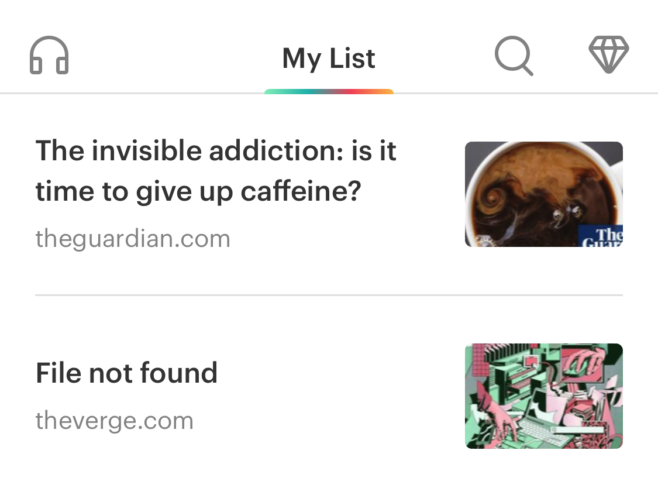
Pocket is an app designed for people with too many tabs open.
The Mozilla-owned service lets users save articles to read later. Available as both a web extension and a phone app, Pocket is the most popular contender among the ‘read-later’ players that help readers digest content at a pace that suits them.
There are certainly a lot of journalists with screaming CPU fans who could benefit from having somewhere besides their tabs bar to house worthy reads, but what’s in it for publishers?
This article is part of Press Gazette’s Platform Profile series. [See also: Instagram, NewsNow, Substack, Shutterstock, Upday, LinkedIn, Apple News/ Apple News+, Twitter, Acast, Authory and TikTok].
What is Pocket?
It’s a freemium app and browser extension that lets users save articles, videos and the like for later consumption. Founded in 2007 as “Read It Later”, an extension on Mozilla’s Firefox browser, it’s now available on most major browsers and operating systems. Mozilla itself bought Pocket in 2017 as part of a bid to boost Firefox’s popularity on smartphones.
While the core features come without charge, the paid premium version offers a few exclusive features including the ability to search saved articles, make unlimited highlights, and — useful for anyone wary of link rot — a “permanent library” that allows readers to access their bookmarked content even if it’s no longer online.
How it works
Pocket keeps a list of your saved articles for both on and offline reading — and listening, thanks to a text-to-speech feature with a robotic voice.
A typical experience goes like this: you’re scrolling through Twitter; you see your peers raving about an article exploring the links between smallpox eradication and the invention of the cronut; you find that the article has an estimated read time of three hours; you remember you're supposed to be working; you tap the Pocket symbol and save the pox-patisserie insights for a later date.
Outside of that core functionality, the service emphasises discovery. New users get signed up to Pocket Hits, a daily newsletter spotlighting notable reads with 4m subscribers and a 20% open rate, according to Adweek.
Pocket is by far the most widely adopted read-later service, with 2m monthly users on its app according to AdWeek. Its affiliation with Mozilla also brings it 35m monthly hits via the Firefox News Tab.
Show me the money
In theory, read-later functions open online publishers to a new group of digital customers more akin to traditional Sunday paper readers than fickle newsfeed scrollers. The attraction for publishers is that, as with newsletters, these readers, while a small proportion of the market, are more deeply engaged with the titles they read and, as a result, valuable.
On this logic, some publishers have worked with Pocket to try to cultivate new or more loyal readers or listeners. Both Slate and Texas Monthly, for example, teamed up with the service to provide saveable lists of articles that serve as further reading to, or source material behind, their podcasts.
Pocket also collates articles into series, named Pocket Collections, and runs a syndication programme, which sees it pay partner publishers to re-circulate their old content on the Pocket Hits newsletter.
A source told Adweek that publishers receive between $125 and $200 for each syndicated article, and syndication can substantially increase page views. Science magazine Nautilus reportedly gets approximately a fifth of its traffic from Pocket, and its publisher told Adweek that “syndicated pieces that normally get 100,000 page views per month… increase to over 700,000 per month”.
Beyond that, publishers can use Pocket to put their content in front of new readers who might become loyal ones: the Wall Street Journal, for example, sponsors Pocket Hits monthly, and has reportedly been working with the service since 2018.
The verdict
The idea of using read-later apps to find new readers, or to deepen relationships with casual ones, is certainly promising.
But as yet, there are not a lot of firm numbers out there proving Pocket’s efficacy for boosting bottom lines. Bill Carey, Slate’s director of strategy, declined to tell Adweek how many new listeners he’d reaped from their partnership and the platform declined to share any further information about how publishers have made money from Pocket with Press Gazette.
Still, if the Wall Street Journal has been working with Pocket for almost four years that suggests something in the partnership is working for them.
And with numbers like those Nautilus gave Adweek, it seems like Pocket’s newsletter audiences may be a lucrative source of engagement for small, specialist publications.
At the very least, the syndication programme seems like a good way to turn any publisher’s evergreen but otherwise inert back-catalogue into a nice source of Pocket change.
Email pged@pressgazette.co.uk to point out mistakes, provide story tips or send in a letter for publication on our "Letters Page" blog
